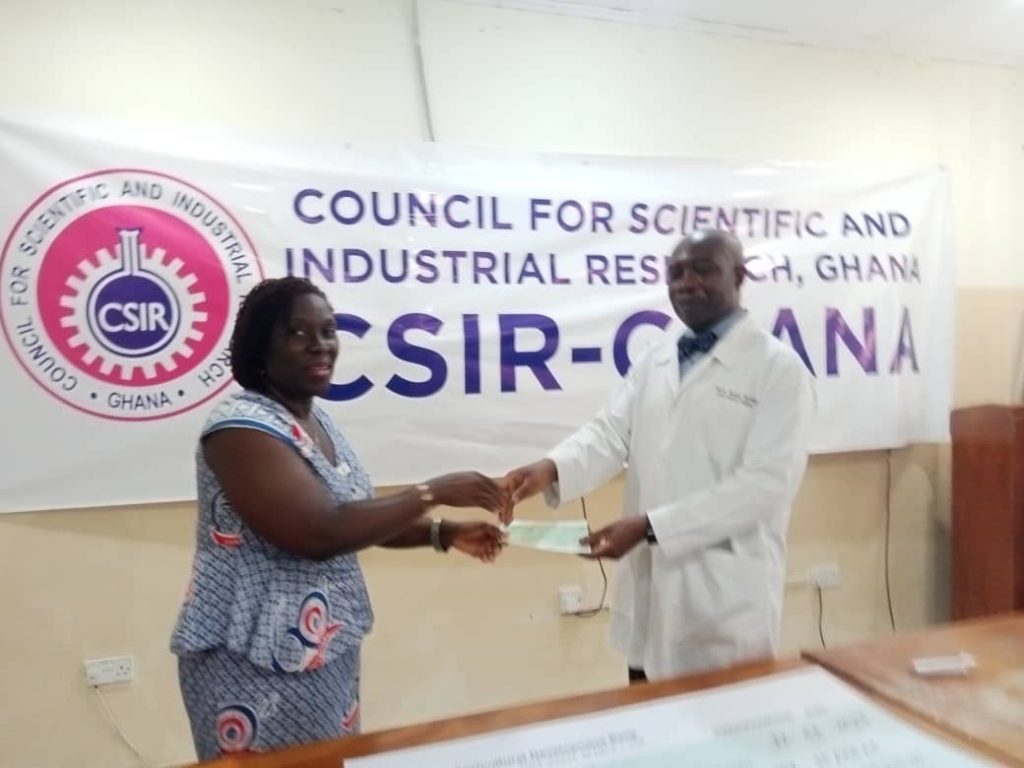By D.I. Laary
Accra, April 17, GNA – The Council for Scientific and Industrial Research (CSIR) has donated the proceeds from its annual Thanksgiving service totaling 10,000 Ghana cedis to the National Cardiothoracic Centre (NCTC) to support their efforts in providing quality healthcare to Ghanaians.
The donation is part of corporate social responsibility (CSIR) initiatives and a commitment by the Council to improving the lives of people, particularly the most vulnerable in society.
The National Cardiothoracic Centre is one of the leading healthcare facilities in Ghana, providing specialised treatment for heart and lung diseases.
The donation from CSIR will go a long way in supporting the centre’s mission to provide affordable and accessible healthcare to all Ghanaians.
On behalf of the Director-General of CSIR, Professor Paul Pinnock Bosu, Mrs. Genevieve Yankey, Director of Administration, CSIR, presented both the dummy cheque and the original cheque to Professor Mark Tettey, Ag. Director, NCTC.
Mrs. Yankey, who was flanked by Ms. Benedicta Nkrumah-Boateng, Head of Corporate Affairs, CSIR, presented the Council’s vision and mission as the foremost science, technology, and innovation institution with the goal of harnessing the power of science and technology to create wealth through research and the development of innovative technologies to accelerate Ghana’s industrial development.
She emphasised that the donation was in line with Council’s commitment to supporting the development of science and technology in Ghana, and expressed hope that it would contribute to the growth of NCTC and its efforts to promote science education in the country.
She further stated that in 2015, the council hosted its first Thanksgiving ceremony for the southern sector institutes, during which renowned clerics led CSIR in praise and thanksgiving to God for his blessings, and that the occasion has since rotated among the Accra institutes.
The Thanksgiving ceremony has become an annual event that brings together staff, stakeholders, and partners to reflect on the achievements of the council and give thanks for their successes.

The CSIR hopes to continue supporting initiatives that promote science education and development in Ghana through similar donations and events.
She explained that, in addition to serving as a corporate platform to express gratitude to God, the money from the offerings was sent to the Korle-Bu Teaching Hospital to fund the National Cardiothoracic Centre as part of the CSIR’s corporate social responsibility.
Professor Mark Tettey, Ag Director, NCTC, said the donation would go a long way in assisting the Cardiothoracic Centre to provide adequate healthcare services to patients, and commended the CSIR’s commitment to supporting healthcare in Ghana, saying “this is commendable and should be emulated by other organisations.”
On the sidelines of the presentation, he told the Ghana News Agency that the centre received roughly 14 theatre patients every month, while the outpatient department alone handled over 1000, and another 50 to 60 patients were hospitalised each month.
He added that as over 90 percent of patients cannot afford treatment, the donation would help to improve the centre’s capacity to provide quality healthcare services and reduce the burden on patients who travel long distances to access healthcare.
Professor Tettey also stated that the centre relied heavily on the generosity of individuals and corporate organisations and urged other organisations to emulate the CSIR’s example and support healthcare at the national cardiothoracic centre.
He further emphasised the need for more support from both the public and private sectors to help the centre repair its broken down facilities and provide services to meet the growing
demand for cardiovascular care in Ghana, stating, “If we can get just one million Ghanaians to donate a bottle of Fanta every month [the monetary value of a bottle of Fanta] to the centre, we can do surgeries free of charge and we don’t have to be going to TVs and others.”
Professor Tettey’s called for support from individuals and corporate organisations highlights the importance of collective efforts in improving healthcare in Ghana, and with more support from both the public and private sectors, the national cardiothoracic centre could expand its facilities and services to meet the growing demand for cardiovascular care, ultimately providing free surgeries to those who need them most.
GNA